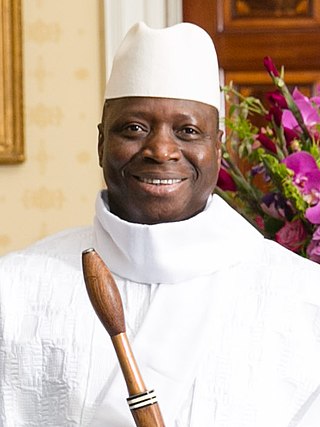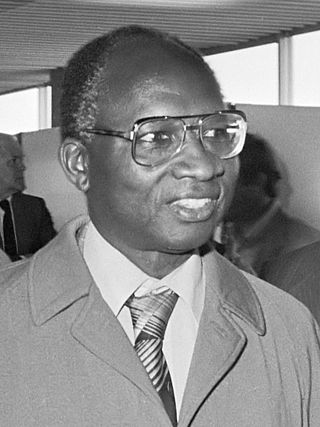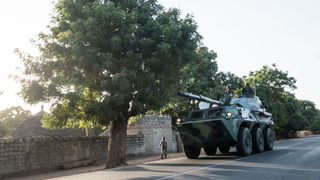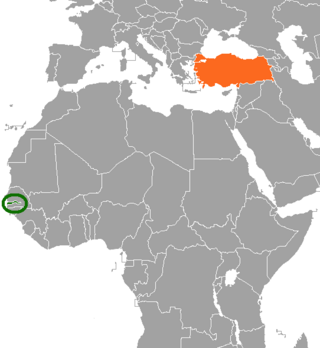
The Gambia, officially the Republic of The Gambia, is a country in West Africa. Geographically, The Gambia is the smallest country in continental Africa; it is surrounded by Senegal on all sides except for the western part, which is bordered by the Atlantic Ocean.

Politics of The Gambia takes place within the framework of a presidential republic, whereby the President of The Gambia is both head of state and head of government, and of a multi-party system. Executive power is exercised by the government. Legislative power is vested in both the government and parliaments.

The first written records of the region come from Arab traders in the 9th and 10th centuries. In medieval times, the region was dominated by the Trans-Saharan trade and was ruled by the Mali Empire. In the 16th century, the region came to be ruled by the Songhai Empire. The first Europeans to visit the Gambia River were the Portuguese in the 15th century, in 1447, who attempted to settle on the river banks, but no settlement of significant size was established. Descendants of the Portuguese settlers remained until the 18th century. In the late 16th century, English merchants attempted to begin a trade with the Gambia, reporting that it was "a river of secret trade and riches concealed by the Portuguese."

Yahya Abdul-Aziz Jemus Junkung Jammeh is a Gambian politician and military dictator who overthrew the elected government and became President of the Gambia from 1996 to 2017, as well as Chairman of the Armed Forces Provisional Ruling Council (AFPRC) from 1994 to 1996.

Sir Dawda Kairaba Jawara was a Gambian politician who served as prime minister from 1962 to 1970, and then as the first President of The Gambia from 1970 to 1994, when he was deposed.

The People's Progressive Party is a political party in the Gambia. It was the dominant ruling party of the House of Representatives and the presidency from 1962 to 1994. The president throughout this time period was Dawda Jawara.

The National Assembly of the Gambia is the unicameral legislature of the Gambia. The authorisation for the National Assembly lies in Chapter VII of the Constitution of the Gambia. It is composed of 53 members directly elected through first past the post, and a further five members appointed by the President.
Sheriff Mustapha Dibba was a Gambian politician who was the 1st Vice-President of the Gambia (1970–1972) and also served as the country's National Assembly speaker from 2002 to 2006. He was also leader of the National Convention Party (NCP).

Ousainou Darboe is a Gambian politician and leader of the main opposition United Democratic Party (UDP). He previously served as Vice-President of the Gambia and Minister of Women's Affairs from June 2018 to March 2019, under President Adama Barrow. He also served as President Barrow's Minister of Foreign Affairs from February 2017 to June 2018.
Assan Musa Camara was a Gambian politician. He served as Vice President of Dawda Jawara, almost continuously from 1972 to 1977, and then again from 1981 to 1982, and the Member of Parliament (MP) for Kantora from 1960 to 1987.

The Gambia is divided into five administrative Regions and one City. The divisions of the Gambia are created by the Independent Electoral Commission in accordance to Article 192 of the National Constitution.
Alieu Badara Njie was a Gambian statesman who served as the 3rd Vice-President of the Gambia from 1977 to 1981. He served as the first Gambian Ambassador to Senegal and in Dawda Jawara's first cabinet. He held several ministerial roles under Jawara and played a key role in securing Gambian independence. He was Minister of Foreign Affairs from 1965–1967 and 1974–77, Minister of Communications from 1960–1961 and 1963–1965, Minister of Works from 1962–1965, Minister of Information from 1970–1971, and Minister of Agriculture from 1972–1974.

Presidential elections were held in The Gambia on 1 December 2016. In a surprise result, opposition candidate Adama Barrow defeated long-term incumbent Yahya Jammeh. The election marked the first change of presidency in The Gambia since a military coup in 1994, and the first transfer of power by popular election since independence from the United Kingdom in 1965.

Adama Barrow is a Gambian politician and real estate developer who has served as President of the Gambia since 2017.

A constitutional crisis occurred in Gambia following presidential elections in December 2016, in which challenger Adama Barrow achieved an upset victory over longtime incumbent Yahya Jammeh. It eventually concluded after a military intervention by the Economic Community of West African States (ECOWAS) led to Jammeh's departure from the country.

The ECOWAS military intervention in the Gambia or the ECOWAS Mission in The Gambia – initially code-named Operation Restore Democracy – is a military intervention in The Gambia by several member states of the Economic Community of West African States.
The House of Representatives of the Gambia was the legislature of the Gambia from 1960 to 1994, succeeding the Legislative Council and being succeeded by the National Assembly.

The Gambia–Turkey relations are the foreign relations between The Gambia and Turkey.

Presidential elections were held in the Gambia on 4 December 2021. The result was a victory for incumbent President Adama Barrow of the National People's Party, who received 53% of the vote, defeating five other candidates.

Parliamentary elections were held in The Gambia on 9 April 2022 to elect members of the 58-seat National Assembly.














